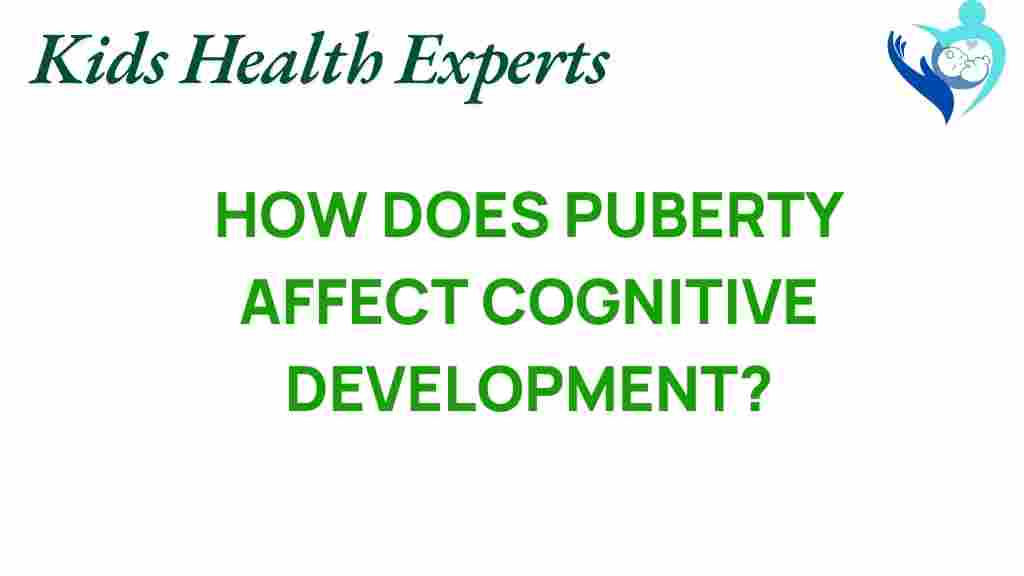Unlocking the Brain: The Impact of Puberty on Cognitive Development
As children transition into their teenage years, they undergo significant changes that affect not only their bodies but also their brains. This crucial period, known as puberty, marks the onset of adolescence, a time where cognitive development is profoundly impacted by hormonal changes, brain restructuring, and emotional growth. Understanding these transformations is essential for parents, educators, and teenagers themselves, as it can facilitate better learning and psychological well-being.
The Connection Between Puberty and Cognitive Development
Puberty is characterized by a surge in hormones that drive physical development, but it also plays a pivotal role in cognitive development. The adolescent brain undergoes several changes, including:
- Pruning of Neurons: During puberty, the brain eliminates unused neural connections, which can enhance efficiency in thought processes.
- Myelination: The process of myelination increases the speed of information transmission between neurons, improving cognitive functions.
- Development of the Prefrontal Cortex: This area of the brain, responsible for decision-making and impulse control, continues to mature throughout adolescence.
These brain changes underscore the importance of understanding how puberty influences learning and behavior during this critical stage of life.
Hormonal Influence on Learning and Memory
The hormonal changes during puberty have a direct impact on cognitive functions such as learning and memory. Key hormones involved include:
- Testosterone: This hormone influences spatial abilities and may enhance certain types of memory.
- Estrogen: Known to improve verbal skills and emotional regulation, estrogen plays a crucial role in cognitive development in females.
- Cortisol: Elevated stress levels during puberty can negatively affect memory and concentration.
As these hormones fluctuate, they can create challenges for adolescents in the learning environment. It is crucial for educators to recognize these changes and adapt their teaching methods accordingly.
Emotional Growth and Psychological Changes
Alongside cognitive development, puberty brings about significant emotional growth. Adolescents often experience heightened emotional responses due to the increased activity in the amygdala, the brain’s center for emotions. This can lead to:
- Intense Emotions: Adolescents may experience feelings of sadness, anger, or euphoria more intensely than before.
- Identity Exploration: The teenage years are a time for exploring personal identity, which can influence decision-making and relationships.
- Peer Influence: Increased importance of peer relationships can affect both emotional and cognitive development.
Understanding these emotional changes is critical for fostering a supportive environment that promotes healthy psychological development.
Learning Strategies During Adolescence
With the changes brought on by puberty and the associated brain changes, it is vital to adopt effective learning strategies. Here are some approaches that can enhance cognitive development during adolescence:
- Active Learning: Encourage adolescents to engage in discussions and hands-on activities that promote critical thinking.
- Mindfulness Practices: Techniques such as meditation can help manage stress and improve focus.
- Encouraging Curiosity: Allowing teenagers to explore their interests can enhance motivation and self-directed learning.
These strategies can help mitigate the challenges posed by the emotional and cognitive changes of puberty, leading to more effective learning experiences.
Challenges Faced During the Teenage Years
Despite the growth and development that occur during puberty, adolescents often face several challenges, including:
- Academic Pressure: The transition to higher academic expectations can lead to stress and anxiety.
- Social Dynamics: Navigating friendships and romantic relationships can be complex and emotionally taxing.
- Self-Esteem Issues: Physical and emotional changes can contribute to insecurities and body image concerns.
Addressing these challenges requires a comprehensive understanding of the interplay between puberty, cognitive development, and emotional growth.
Tips for Parents and Educators
To support adolescents during this transformative period, parents and educators can implement several strategies:
- Open Communication: Foster an environment where teenagers feel comfortable discussing their thoughts and feelings.
- Encourage Healthy Habits: Promote regular exercise, a balanced diet, and sufficient sleep to support cognitive function.
- Provide Emotional Support: Be attentive to the emotional needs of teenagers, offering guidance and understanding.
By taking these steps, adults can help adolescents navigate the complexities of puberty and support their cognitive and emotional development.
The teenage years are a period of significant change, where puberty catalyzes profound transformations in both the brain and emotional landscape. Understanding how these changes affect cognitive development is essential for fostering effective learning environments and supporting adolescents in their growth.
As we unlock the complexities of the adolescent brain, let us remember the importance of empathy, communication, and support during this critical stage. By being aware of the impacts of puberty on cognitive development, we can better equip teenagers to thrive academically and emotionally.
For further reading on adolescent psychology and cognitive development, check out the National Institute of Mental Health. Additionally, to explore more about effective learning strategies during adolescence, visit this resource.
This article is in the category Mental and created by KidsHealthExperts Team
